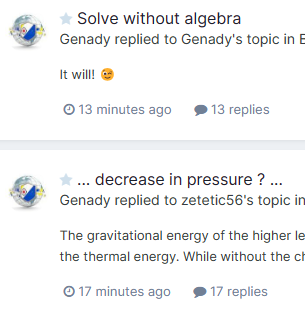-
Posts
5441 -
Joined
-
Days Won
53
Content Type
Profiles
Forums
Events
Everything posted by Genady
-
No, not philosophy. Speculations.
-
Then, this thread should be not in the Evolution forum, but in the Speculations forum. Which I ignore.
-
You can un-ignore.
-
Yes, I am wondering the same. Can't find an independent source of it.
-
What do you think of Llinás's law - Wikipedia? I never heard of it before this discussion and don't know what its scientific status is.
-
What do you think was the last "law" in biology?
-
It seems to me that the Hubble's law was the last one that fits this description. (Thanks for the list again, @Jez. +1)
-

Wave function collapse (split from informational diode)
Genady replied to MJ kihara's topic in Quantum Theory
Actually, the wave function describes probability amplitude, a complex value. The probability distribution is a squared modulus of the wave function and contains less information about the state of the system. -
I also don't think that the body rises more slowly when the wall moves. But I think that there is another term in the equation that needs to be taken in account, namely, the kinetic energy of the fluid replacing the volume occupied by the body. When the wall does not move, this fluid has to come from above the body down to under the body. But when the wall moves, part of the replacing fluid comes from the side, horizontally, because the volume there decreases. Thus, less replacing fluid comes from above, which, I think, reduces the kinetic energy of the moving fluid. IOW, when the wall moves, the energy of the impact of the body and the barrier is the same, but the thermal energy produced by the moving fluid, is smaller. I am guessing here. Does it make sense?
-
LOL. Thank you. Interesting list. I've started to look at these laws from bottom up and immediately found - attention, OT - that Llinas's law points to a fundamental difference between the neuron in neuroscience and the "neurons" in DNN used in AI. In DNN, all neurons are interchangeable, and the only difference is in the weights assigned to their connections. Quite possible. Here is an anecdote: "I have an equation; do you have one too?" Paul Dirac, on meeting Richard Feynman. He didn't say "a law".
-
It seems plausible, but how important is a visual detection from below with today's war tech?
-
Yes, no entry for, e.g., Mendel's laws either. I don't think that the Stigler's law would pass a statistical test.
-
How does the Stigler’s law of eponymy apply to, say, Kepler's or Newton's laws?
-
I think that these more recent laws are called "laws" for marketing purposes.
-
Thank you. Perhaps I better narrow down the question and limit it to "precise sciences" (or whatever they are called) like physics and chemistry. Otherwise, we find things like "Tobler's first law of geography", (Tobler's first law of geography - Wikipedia).
-
Every "law" has a name. What is a name of this law? Is it "iNow first law"?
-
For several hundreds of years important statements in natural sciences were called "laws". But some time ago new "laws" stopped to appear, and the important statements now seem to be rather called "principles" and "equations." Is it so? If so, what was the last "law"?
-
What do the length of the arms and the duration of the clap have to do with the question?
-
Yes, just a bit... +1 BTW, ChatGPT didn't have this deception as the problem has been presented in a text. It didn't help.
-
I'd ask all members to keep an eye and to report any other such sighting.
-
This is not possible according to this theorem: No-communication theorem - Wikipedia
-
See something peculiar in this picture? Especially considering that both 13 and 17 are prime numbers...
-
It will! 😉
-
The gravitational energy of the higher level of fluid on the right comes from the battery. The rest of the battery energy goes into kinetic energy of the moving fluid and eventually becomes the thermal energy. While without the changing of the level, all the battery energy goes into the kinetic energy and then becomes the thermal energy.


